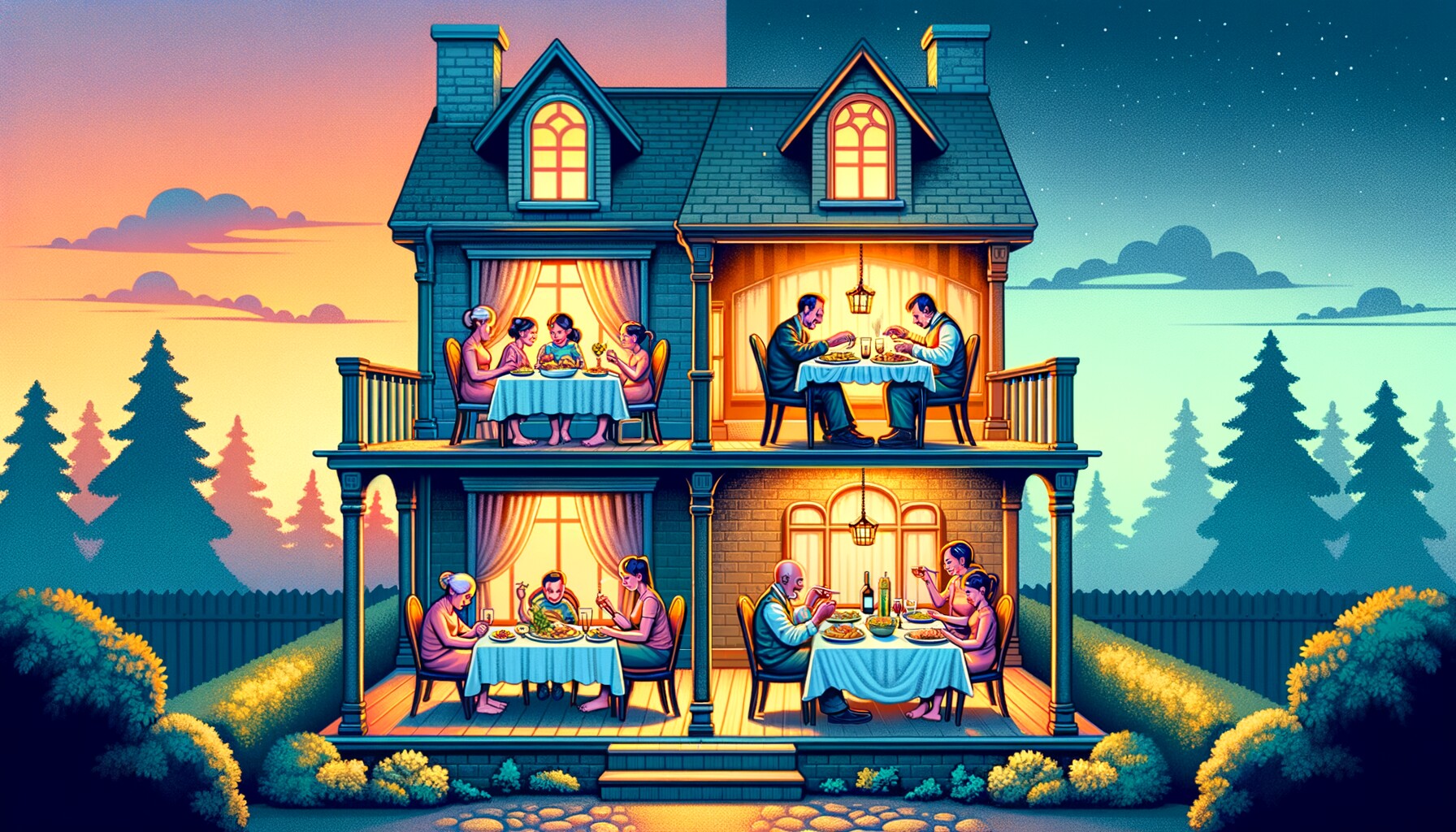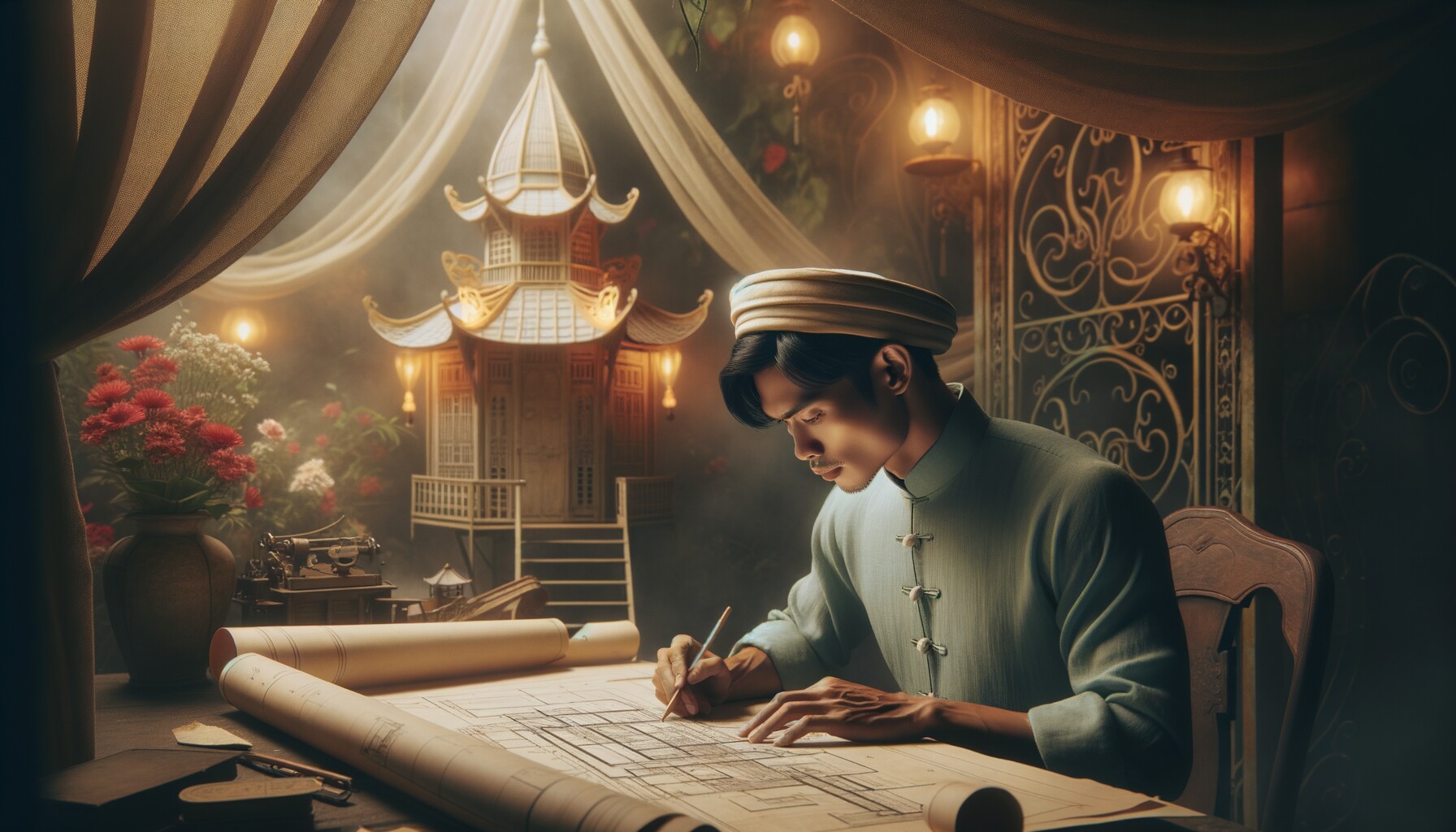The Fairy Tale of the Gatekeeper’s Son
The Marshal lived upstairs, while the gatekeeper lived downstairs in the basement. The two families lived very separately, first and foremost because of the floor that separated them, and secondly because of their class differences. However, they lived under the same roof, and both floors overlooked the same street and courtyard.
In the courtyard, there was a grassy area with a flowering acacia tree in the middle, as it was the season for acacias to bloom. Occasionally, the nursemaid, overdressed for the occasion, would come by the tree, carrying the Marshal’s daughter, little Emily, who was even more overdressed than her nanny. Before her, the gatekeeper’s son, barefoot, was dancing. He had big, dark eyes and reddish-brown hair. She smiled and waved her tiny hands at him. When the Marshal looked down from his window and saw this, he nodded and said, “Wonderful!”
The Marshal’s wife, who was so young that she could have been mistaken for their daughter, never looked down at the courtyard. She had ordered that the boy, the child from downstairs, could play in front of her daughter to amuse her, but he must not touch her. The nursemaid was very loyal to her mistress’s command. The sun shone into the homes of those who lived downstairs, as well as those who lived upstairs.
The following year was the same. The gatekeeper’s son was chubby, with lovely cheeks like a blooming lily. The Marshal’s daughter was graceful and pretty, with skin as white as the acacia flowers. She rarely went downstairs to the tree. She usually went out for a carriage ride with her mother. When she left and returned, she always nodded to the gatekeeper’s son, George, and even blew him kisses until her mother told her that she was too old for such behavior.

Illustration.
One morning, George had to deliver newspapers and mail to the Marshal’s house early in the morning. As he climbed the stairs and passed by the sandpit, he heard chirping coming from inside. He thought it was a lost chicken, but it turned out to be the Marshal’s daughter, Emily, dressed in thin muslin and lace.
She whispered:
“Don’t tell Mom and Dad, or they’ll be angry!”
George asked:
“But what is it?”
She replied:
“It’s all on fire, everything’s burning!”
George jumped up the stairs and into the Marshal’s house. He opened the door to Emily’s room. The curtains were almost burnt to ashes, and the iron rods were glowing red. George climbed onto a chair, pulled down the burning curtains, and shouted for help. If it weren’t for him, the whole house would have been consumed by the fire.
The Marshal and his wife questioned Emily about what had happened. She said:
“I struck a match, just one. It flared up, and the curtains caught fire. I spat, trying my best to put it out. When I ran out of saliva, I ran away, afraid that Mom and Dad would be angry.”
The Marshal’s wife said:
“Spit! What kind of word is that? Have you ever heard Mom and Dad use that word? You must have learned it from those people downstairs, right?”
Nevertheless, George was rewarded with a dollar. He didn’t buy any cakes but put the money into his savings. Soon, he had enough to buy a box of colored pencils to color his drawings because George loved to draw. His tiny fingers skillfully wielding the pencil were a wonderful sight. He gave his first colored drawings to Emily. The Marshal praised, “Wonderful!” Even the Marshal’s wife had to agree that everyone could clearly recognize what he wanted to portray. “The boy is a genius!” This was what the gatekeeper’s wife heard and ran downstairs to tell her husband.
The Marshal and his wife were aristocrats. They had their family crests painted on both sides of their carriage. The wife even had the crests embroidered on all her clothes, one on the right side and one on the left, on her travel bags, and even on her sleeping caps.
The wife’s crest was purchased by her father at a high price, paid for with a lot of money, so much so that his hands got tired from counting the coins. When she was born, neither her father nor her mother was of noble descent, and she was born seven years before the crest. Most people remembered this, but the Marshal’s wife didn’t remember at all.
The Marshal’s crest, on the other hand, was ancient and intricate. Wearing it required one to stand tall, with cracking joints. How would it be if there were more of them? That’s why you could hear the Marshal’s wife’s joints cracking as she stood up straight in her most elegant dress, climbing into the carriage to attend a ball at the palace.
The Marshal was old, with white hair. But when he rode a horse, he still looked dignified. He knew it, so he rode every day. A soldier followed him at a proper distance, in the proper style. When he entered the room, people thought he was still towering on his tall horse.
As for medals, he had countless, heavy ones all over his body. But that was not really his fault. He had joined the army when he was young. He often participated in small-scale maneuvers and exercises during peacetime. Regarding this, he often told a story, and it was the only one he knew.
Once, a non-commissioned officer under his command cut off the escape route of a prince and captured him and his entourage as prisoners. The prince and his entourage, as prisoners, had to pass through the city, following the victorious general. It was a memorable event that the Marshal often retold. He recounted the words he said when returning the prince’s sword: “Only a non-commissioned officer could capture Your Highness as a prisoner. I could never do such a thing.” The prince replied, “You are truly one of a kind.”
The Marshal had never been to war. When a war broke out, he was sent as an envoy to three courts. He spoke French fluently, to the point that he almost forgot his mother tongue. Moreover, he was an excellent dancer. That’s why medals grew on his chest like weeds in a field. The guards saluted him with their rifles.
One of the most beautiful young ladies in Denmark also admired him and became the Marshal’s wife. They had a beautiful daughter. She was so beautiful that people said she was a gift from heaven. This was our Emily. At first, the gatekeeper’s son danced in the courtyard to amuse her, and later, he gave her his drawings and colored them for her. Emily looked at the drawings, delighted, but then tore them up. Yet she was so well-behaved!
The Marshal’s wife said:
“My little rose, you were born to be the wife of a prince.”
The prince was not far away, just across the street. But no one knew anything. People never looked beyond their doorstep. One day, the gatekeeper’s wife said to her husband:
“The other day, our son shared his cake with Miss Emily. It didn’t have any meat or cheese, but she thought it was delicious, just like a pastry. If the Marshal or his wife saw what the children ate, they would be furious! But they don’t know anything.”
George had shared his cake with Emily. He would also gladly share his heart with her if it made her happy. He was a good, smart, and clever boy. He often attended evening art classes. Emily also went to school, spoke French with her nanny, and had started music lessons.
The gatekeeper’s wife said to her husband:
“So our George is going to receive his First Communion this Easter.”
The old man said:
“It would be better to apprentice him. We should choose a stable profession for him. That way, he won’t be staying at home.”
The wife replied:
“He’ll still be sleeping at home. What master would let his apprentice sleep at home? We still have to make his clothes. It’s better to keep him at home. We can also scrounge enough food for him. A few potatoes, and he’ll be happy. He doesn’t have to pay for his art classes. The teacher said, ‘Let him pursue it,’ and maybe he’ll make us happy one day?”
The clothes for the First Communion were already made. His mother sewed them herself. The neighbor, a skilled tailor, cut the fabric for them. The gatekeeper’s wife said:
“If he could have a big shop with many employees and apprentices on a busy street, he would become the king’s tailor.”
The clothes were ready, and George was all set. On the big day, his godfather, an old ironworker at the hardware store, gave him a large silver pocket watch, old and worn, but it still worked well. It was a precious gift.
Emily gave him a leather-bound book of hymns. On the first page, it said, “From George and Emily, with affectionate protection.” These were the words the Marshal’s wife dictated to Emily to write. The Marshal looked at it and said, “Wonderful!”
The gatekeeper said:
“It’s a noble gesture from such noble people.”
George had to wear his best clothes and carry the book of hymns upstairs to show his gratitude.
The Marshal’s wife, wrapped in shawls and cloaks, sat on the sofa. She was having a terrible headache, the kind she often got when she was upset. She tried her best to be not-so-gentle with George, wishing him all the best and, above all, never to have a headache.
The Marshal, in his pajamas, strolled around with a large-brimmed hat on his head. He walked in a pair of red-striped leather boots. Lost in thought or memories, he strolled three times around the room and then stopped to say, “So the boy George is now a Christian! Be a good man and respect the State. If you follow this advice, you will do well and, when you are old, you can tell yourself that it was the Marshal who taught you this.”
Saying all this at once was a lot for the Marshal. That’s why he immediately returned to his musings. He had a serious look that suited him well. But of all the things George saw and heard that day upstairs, the image of Emily was the one that remained in his mind, indelible, more than anything else.

Illustration.
Gentle, graceful, and lovely, she looked like a fledgling bird. “I should draw her on a soap bubble,” George thought as he thought of the translucent bubble floating in the air. Her golden curls gave off a fragrance like newly bloomed roses. It was this fairy-like girl, this heavenly creature, with whom he had once shared a cake, and she had eaten her portion happily, nodding at him with each bite, indicating her satisfaction. Did she still remember that? Surely she did, and that was why she gave him the book of hymns to thank him.
After that, on the first full moon of the new year, he went out to the fields, a piece of cake in his pocket, and his book of hymns in his hand, to divine his future, as people often did, believing that the saints’ predictions were never wrong.
He opened the book and divined a passage about gratitude, predicting a happy future for him. He opened it a second time to divine Emily’s fate. He was very careful not to open the book to the passages about death but still ended up on a page that spoke only of death and graves. George exclaimed to reassure himself, “It’s just superstition.” But he was truly frightened when, not long after, the lovely Emily fell ill and the doctor’s carriage came to their house every day.
The gatekeeper’s wife said:
“They can’t keep her. God, in His infinite wisdom, knows best when to take someone.”
Yet they managed to save her, and she recovered from her illness. While she was convalescing, George drew pictures and sent them to her to cheer her up. One day, he drew the Kremlin Palace, the ancient Kremlin with its round-topped towers, which looked like giant golden onions glowing in the sun. At least that’s how they looked in George’s drawing. Emily liked it very much. So George drew a whole new series of pictures for her, all houses, because he thought she would be happy to imagine all the beautiful things that could be behind the large doors and windows in the drawings.
He drew a sixteen-story Chinese temple, with bells on each floor. He drew two Greek temples with elegant marble columns and stairs on all sides. He drew a Norwegian church, and you could tell from the drawing that it was made of wood, with intricate carvings all over.
But the most beautiful drawing was the one he called Emily’s Castle because he thought she should live in such a place. He designed the castle himself. He combined all the most beautiful elements from the previous drawings. It had the carved beams of the Greek temple, bells on every floor like the Chinese temples, and golden domes like the Kremlin’s on the roof. It was truly a fairy-tale castle.
Under each window, George wrote what each room was for. For example, “Here, Emily sleeps. This is where she studies dancing. Here, she plays. This is where she receives guests, etc.”
Looking at this strange castle was so interesting that people couldn’t get enough of it.
The Marshal praised, “Wonderful!”
The old Count, whose lineage was even nobler than the Marshal’s, also had a castle. The Count said nothing. He had heard that the castle was designed by the gatekeeper’s son. The boy was still young, very young. But no, that wasn’t quite right because he had already received his First Communion. After seeing these drawings, the Count had a plan, but he kept it to himself.
One gray, gloomy, and damp morning marked the beginning of George’s best day. The professor from the Academy called him and said:
“My little friend, listen to me. God has blessed you with talent, and fate has brought you to kind people. The old Count from the corner has told me about you. I’ve seen your drawings, and we don’t need to discuss them at length. There’s a lot to improve. But starting today, you can come to me twice a week to learn to draw better. I think you’re more inclined to architecture than painting. Later, you’ll also have time to think and choose. Now, go and thank God for bringing you to the Count.”
The Count’s house on the corner was huge and beautiful. Around the windows were carvings of elephants, camels, and unicorns, the work of ancient times. However, the Count appreciated all contemporary works, even if their creators lived upstairs, downstairs, or in the attic.
The gatekeeper’s wife said:
“I think the nobler the lineage, the less arrogant they are. Look at the old Count. How simple and friendly he is! He talks to us just like you and me. Neither the Marshal nor his wife is like that. That’s why I was so happy yesterday when our George was so well received by the Count. Today, when I met the Count, I felt the same way. It’s a good thing we didn’t apprentice George. The Count told me he has talent.
The husband said:
“Yes, but he needs help to succeed.”
“He’ll get help. The Count promised me that.”
The husband said:
“Maybe it was also thanks to the Marshal. We should go and thank him.”
The gatekeeper’s wife replied:
“Yes, but I don’t think it was because of him that we have this blessing. I will thank God and also pray for Emily’s recovery.”
Indeed, Emily recovered. She grew up and became more beautiful. As for George, he progressed very quickly. At the Academy, he won silver and gold medals.
The gatekeeper’s wife said with tears in her eyes:
“It would have been better to apprentice him. Then he wouldn’t have gone so far away. I will never see him again, my dear boy. Even if he comes back, he won’t be the same. But maybe he doesn’t want to leave the place people say is so beautiful.”
The husband said:
“That’s for his own good. It’s better for his career.”
“You’re comforting me, and I thank you

































